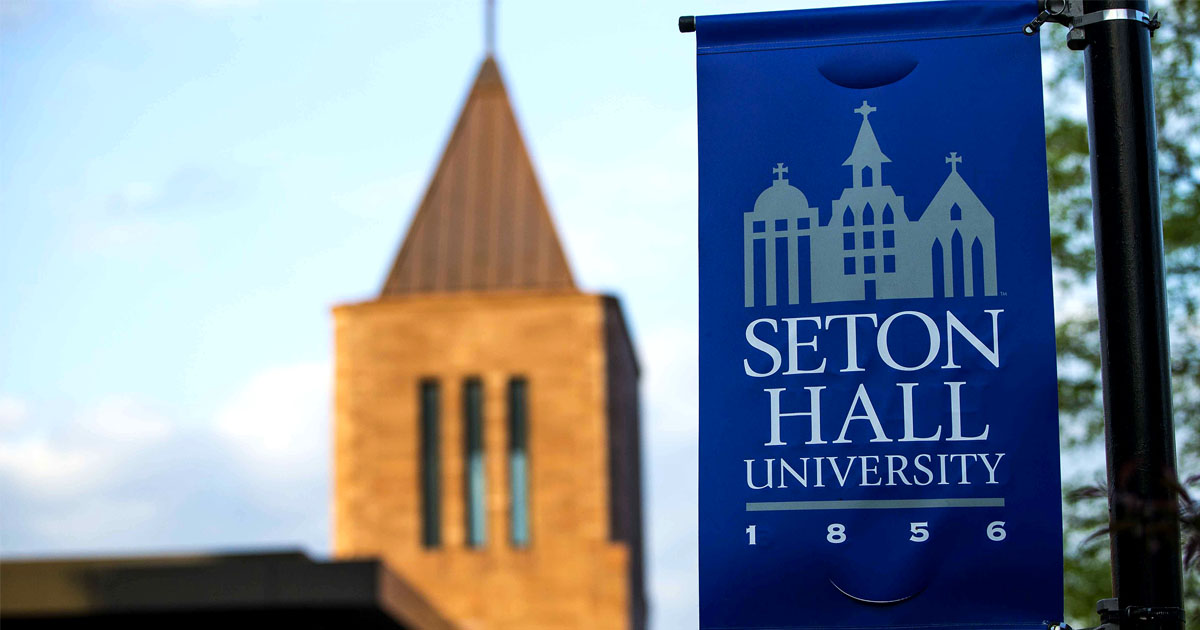On Tuesday, June 11, Seton Hall University’s Teaching, Learning and Technology Center hosted the inaugural AI Teaching & Learning Symposium, in collaboration with Edge. The day-long event welcomed over 160 educators who participated in discussions about
the impact of artificial intelligence (AI) on education, exploring policies and guidance,
ethical challenges, accessibility implications, and practical opportunities for improving
learning outcomes using AI.
“Edge was thrilled to co-host the AI Teaching & Learning Symposium with Seton Hall
University,” said Adam Scarzafava, Associate Vice President, EdgeEvents & Digital
Marketing. “When a topic is impacting institutions and changing the classroom as rapidly
as AI, it is vital for higher education leaders, faculty, and staff to have opportunities
to come together and learn from each other. Seton Hall University was an ideal partner
to bring our community together for collaboration.”
The symposium offered participants a variety of sessions, beginning with a presentation
by exhibitor Adobe on aligning AI offerings with the company’s AI ethics principles.
The program then featured a unique student panel, moderated by recent alumna Julia
Boivin, which focused on students’ experiences with generative AI tools in courses
taught by Stillman School of Business Professor John Shannon, J.D. The panel discussed the practical applications of generative AI in learning environments,
the technical and ethical challenges faced, and the solutions implemented, highlighting
the development of digital and problem-solving skills. The discussion also covered
key takeaways on academic performance and engagement, and reflections on how these
experiences made the students feel better prepared for an AI-driven workforce.
“Artificial intelligence is rapidly evolving, transforming education by personalizing
learning, automating tasks, and enhancing data analytics. We must prepare for a future
significantly influenced by technology, particularly AI as a general-purpose technology,”
explained Shannon, discussing his approach to integrating AI into his courses. “Higher
education must teach our students the practical use of AI tools while emphasizing
critical thinking, ethics, and interdisciplinary knowledge. This equips graduates
with the skills and adaptability needed to thrive in a rapidly changing technological
landscape.”
The symposium showcased presentations from thought leaders at universities and colleges
across the tri-state area, with speakers even coming from as far as Tennessee State
University. Notable sessions from Seton Hall University included “Enhancing Creative
Workflows with Generative AI in Adobe Photoshop” by Christopher Petruzzi, Manager
of UI and Multimedia Design; “Integrating Generative AI in Higher Education Learning
Environments: Opportunities and Challenges” by Professor John Shannon; and “Using
AI Avatar Patients to Increase Student Readiness” by Leslie Rippon, Associate Professor in the Department of Athletic Training, Genevieve Zipp, Professor and Program Director of the PhD in Health Sciences, and Lorene Cobb, Assistant Professor in the Department of Physical Therapy. Exhibitors Amazon Web
Services, Anthology and e+ highlighted their efforts to support innovation in higher
education by providing the infrastructure and tools needed to improve student outcomes,
advance research, and transform university operations.
“I am incredibly proud of Seton Hall’s role in cohosting the inaugural AI Teaching
& Learning Symposium,” said Seton Hall’s CIO, Paul Fisher. “By engaging a diverse group of academic professionals to explore these critical
topics, we collectively advanced our understanding and approach to integrating AI
in education. This event emphasized the importance of cultivating a collaborative
community dedicated to innovative educational practices.”
Seton Hall is taking proactive steps to address the rapid advancement of AI and its
profound influence on education. This commitment includes ongoing dialogue, research,
and implementation of AI technologies that uphold the University’s ethical standards,
promote inclusivity, and empower students with critical skills. Initiatives such as
the University’s involvement in the prestigious American Association of Colleges and Universities (AAC&U)’s inaugural Institute on
AI, Pedagogy, and the Curriculum and Seton Hall’s Teaching Learning and Technology Roundtable foster this ongoing dialogue. The Roundtable has a dedicated AI committee, co-chaired
by Ruchin Kansal, MBA, and Jess Rauchberg, Ph.D., responsible for researching AI’s effects on higher education, aiding policy development,
curating integration best practices, and exploring AI’s implications for the future
workplace. As AI continues to evolve, Seton Hall remains dedicated to leading discussions
and initiatives that shape the future of higher education, ensuring graduates are
equipped to navigate and thrive in a rapidly changing world.
Further AI resources can be found in the TLTC’s AI Resource Center and the Center for Faculty Development’s Generative AI Resources for Faculty.
Categories:
Science and Technology

